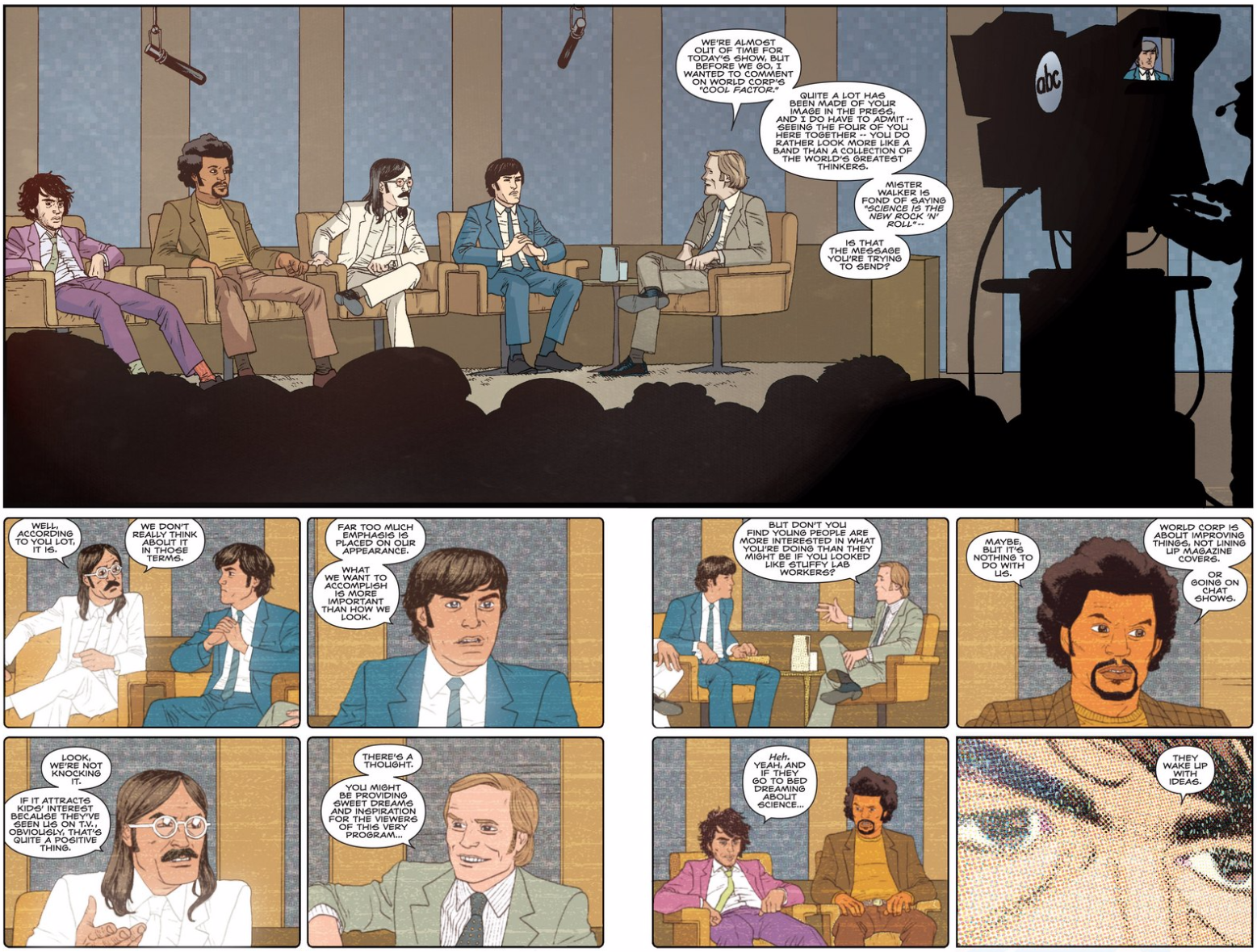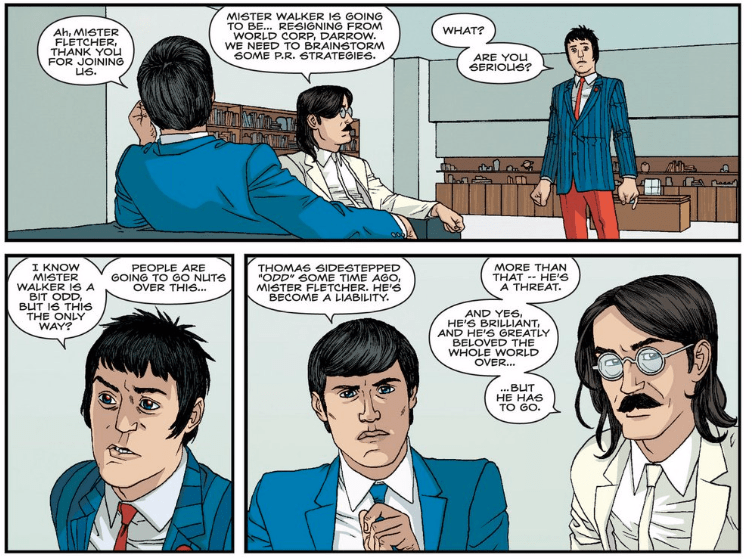Rock and roll and science are commonly thought of as polar opposites: one sexy and dangerous, the other nerdy and inscrutable. But a great comic-book series imagines that the world would be a million times cooler if the two were one and the same.
Nowhere Men is a post-Steve Jobs comic. It taps into the quasi-religious adulation surrounding people who deliver technological advancement unto the masses and grafts that fascination onto the pop-music pantheon cycle of the last 20 years. The series’ central premise revolves the meteoric evolution of four scientists — Simon Grimshaw, Emerson Strange, Dade Ellis and Thomas Walker — into a company called Worldcorp. Decades after they achieve ridiculous amounts of money and fame, the four men are deeply estranged. Emerson Strange runs WorldCorp by himself, Simon Grimshaw runs a rival science megaconglomerate and the other two founders are missing and comatose.
Strange’s last stab at creating a world-changing legacy blows up when a secret space station explodes. Its quarantined crew — whose collective infection with a mysterious mutagenic super-virus — escaped to the surface of Earth via experimental teleporter. The changing crew members are becoming radically different creatures and part of their drama is trying to puzzle out what exactly is happening to them.

Written by Eric Stephenson with art by Nate Bellegarde, Dave Taylor, Emi Lenox and Jordie Bellaire and others, Nowhere Men takes standard-issue superhero tropes and pulls them apart. Similarities to the Fantastic Four, Doom Patrol and X-Men float up through the text and there are moments of fun science-hero-style action in these pages. But the series’ biggest inspiration is the 1960s British Invasion that saw the Beatles, Rolling Stones and other acts take America by storm. Stephenson swaps out science for music and then extrapolates a wholly changed world where geniuses are the focal points of the public imagination.
Nowhere Men #7 came out this week, ending a long series hiatus of more than a year. Re-reading the entirety of Nowhere Men made me think about the formula that seems to dictate how pop celebrity plays out in the public eye. The canniest thing that the creators of Nowhere Men do is deconstruct and repurpose that formula onto a conceit with scientists at the center. The book nails the premise of its elevator pitch so perfectly that you can only marvel at the parallels. Its characters exude outrageous messianism that you desperately want to believe in.

In sharply designed text passages, Stephenson leans on the importance of the interview as a window of insight into an admired mind. These aren’t just exposition dumps; they’re callback homages to the Esquire, Playboy, Life magazine interviews that won over legions of fans.
These artifacts of Nowhere Men‘s cooler alternate reality all tease out familiar tropes of post-modern celebrity. A rise-to-fame arc crashes into a break-up — illuminated by insider retrospectives that show internal tensions — splintering off into a new band by an embittered former comrade. Here, it was precipitated by Walker’s tuned-out eccentricities and Grimshaw wanting to sell out and cook up weaponizable super-science with the government, only to be opposed by Ellis and Strange’s change-the-world idealism.

If the four original WorldCorp founders were the Beatles, then Simon Grimshaw’s Grimshaw Holdings is Wings. Other familiar beats get hit, too: the power of popularity lists/rankings, the seductive mystique of the recluse star, the symbiotic necessity of hangers-on, the “have they still got it/losing their edge” doubts.

Most importantly, Nowhere Men‘s tone replicates the awe and fear that come with scientific advancement. Many of its infected characters are changing in disgusting, scary ways that make them frighteningly powerful. As with all innovation, panic surrounds these changes but possibility is there, too. Think about cell phones: decades ago, folks were worried that they’d make everyone sick with radiation, now we carry them around in pockets and purses everyday. It’s not even that the fears have been disproven, either; it’s just that their heretofore unimaginable utility has made them ubiquitous and practically mandatory. The new science things that scare us can change the world.


Comments
One response to “In Nowhere Men, Scientists Are The New Pop Idols”
FINALLY! I thought this was never coming back! Thanks for the heads up!